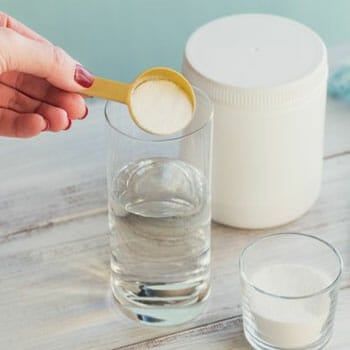Choosing between creatine pills and powder depends on your lifestyle, absorption priorities, and personal preferences.
In my experience as a fitness trainer, I've discovered that pills provide convenience, whereas powder allows for customizable dosages and faster absorption. While this holds true for me, I've also consulted other experts and researched additional factors to consider for my clients.
This article will delve into the differences between creatine capsules and powders, offering guidance on choosing the type of creatine that best suits your fitness goals.
Quick Summary
- The main differences between creatine pills and creatine powder center on their absorption rates, ease of intake, and impact on training effects.
- Creatine functions as a crucial energy source for muscle contractions, boosting athletic performance by elevating phosphocreatine and free creatine levels in muscles.
- Choosing either pills or powder with the same daily dose, such as 3 to 5 grams, can yield performance benefits.
- As a fitness trainer, it's crucial to consider creatine supplements with added ingredients to maximize performance and expedite fitness progress.
Creatine Powder vs. Creatine Capsules

Creatine pills are essentially creatine powder enclosed in a capsule, meaning both supplements can potentially yield similar effects. The main difference between them boils down to the convenience and the speed at which the body absorbs the supplement.
Before considering which one best suits you, let’s review their differences:
1. Convenience
Pills provide a convenient option for busy individuals to carry health supplements. While some prefer the simplicity of pills, the daily consumption of 3-5 pills for a creatine dose can be overwhelming. For most people, we suggest the ease of mixing creatine into a glass of water or a workout tumbler for on-the-go convenience at the gym.
2. Absorption
Powder supplements are generally easier for your stomach to absorb, allowing for faster processing and delivery to muscle tissue. Conversely, while a creatine monohydrate capsule takes a bit longer to digest, you can easily adjust the timing. It's important to emphasize that the speed of delivering amino acids is a primary concern for professional athletes.
3. Training Effects
Supplementing with creatine pills and powders can potentially yield similar training effects since they are essentially the same supplement in slightly different forms. I've observed that we experience the same effects whether we choose pills or powder, as long as we maintain consistent doses, preferably 3 to 5 grams daily.
“There is substantial evidence to indicate that creatine supplementation during resistance training is more effective at increasing muscle strength and weightlifting performance than resistance training alone.”
- Eric Rawson, Researcher at Department of Exercise Science & Athletics, Bloomsburg University
Related posts:
Pros and Cons of Creatine Powder

Creatine powder, resembling whey protein, is favored by many bodybuilders for its convenience and cost-effectiveness.
This is especially true during loading phases when aiming for a higher dose, according to the Journal of the International Society of Sports Nutrition [1].
The most common powder, creatine monohydrate, is known for easy blending into smoothies, allowing faster absorption for a quicker muscle boost when consumed as a drink.
However, our team found that some powders can be challenging to mix, resulting in clumps, and bringing them for a later gym session can be inconvenient, though not a major issue.
- Cost-effective option
- Easy blending into morning smoothies
- Fast absorption into your system
- Challenging to mix with water
- Not suitable for portability
Pros and Cons of Creatine Pills

Creatine pills are highly portable, making them convenient for on-the-go use. Transporting a few capsules is more manageable for evening gym goers than carrying a tub of powder.
Capsules contain precise measurements, crucial for dealing with small doses where even a minor powder spill can affect intake.
However, capsules may not be ideal for creatine loading, as swallowing numerous pills can be cumbersome.
Additionally, for immediate pre-training boosts in bodybuilding, capsule supplements may take slightly longer to digest.
- Convenient to carry in your gym bag for anytime use
- Ensures precise dosage every time
- Reduces wastage compared to spilled or hard-to-reach tubs
- Not suitable for loading phases due to multiple pills
- Slower digestion and absorption
Other Factors To Consider Before Buying
Before buying your creatine supplements, take these additional factors into account for guidance:
- Cost
The cost of creatine pills and powder is generally quite similar. In most cases, supplements claiming higher quality might have slightly higher prices. Nonetheless, creatine continues to be one of the most affordable and effective supplements, regardless of its form. - Flavor
Creatine powders and pills are available in unflavored options. Typically, there are no flavored creatine pills on the market. However, powders can come in flavored choices. Therefore, if you prefer a flavored supplement, the powder form is your best choice.
- Additional Ingredients
Regarding added ingredients, high-quality creatine powders often incorporate additional vitamins and amino acids. On the other hand, creatine pills are unlikely to contain additional ingredients aside from creatine.
What Does Creatine Do to Athletic Performance?
Creatine supplementation before workouts can prevent fatigue and significantly improve athletic performance by increasing muscle energy stores.
When used as a supplement, its main goal is to boost the body’s levels of phosphocreatine and free creatine in muscles [2].
Over the years, my clients and I have noticed that taking creatine before workouts helps prevent fatigue and gives us a significant boost in physical performance.
FAQs
Should I Take Creatine Every Day?
You should take creatine every day for optimal results in increasing exercise performance and strength. A suggested approach involves starting with a loading period and then transitioning into a maintenance phase while consistently incorporating creatine into your daily routine.
Will Creatine Make You Gain Weight?
Creatine can make you gain weight, but it primarily involves lean body mass as creatine enhances muscle growth. The increase in weight may also be attributed to water retention within muscle cells, but this weight is not visibly noticeable on the body.
How To Choose One for Your Lifestyle
When considering convenience, pills are straightforward for on-the-go use, making it simple to enhance exercise performance with timed pill consumption.
Conversely, creatine powders offer flexibility and faster absorption for pre- or post-workout needs, though they come with the challenge of measuring the right powder amounts.
Over the years, our team hasn't had any experience with muscle fluid retention with either form of creatine. However, we always prioritize high-quality creatine supplements to ensure effectiveness and safety.
References:
- https://jissn.biomedcentral.com/articles/10.1186/1550-2783-10-36
- https://www.ncbi.nlm.nih.gov/pmc/articles/PMC5753968/
About The Author
You May Also Like







I find that creatine supplements pills work best for me than powder.
Creatine monohydrate pills are still the best for me for muscle endurance!